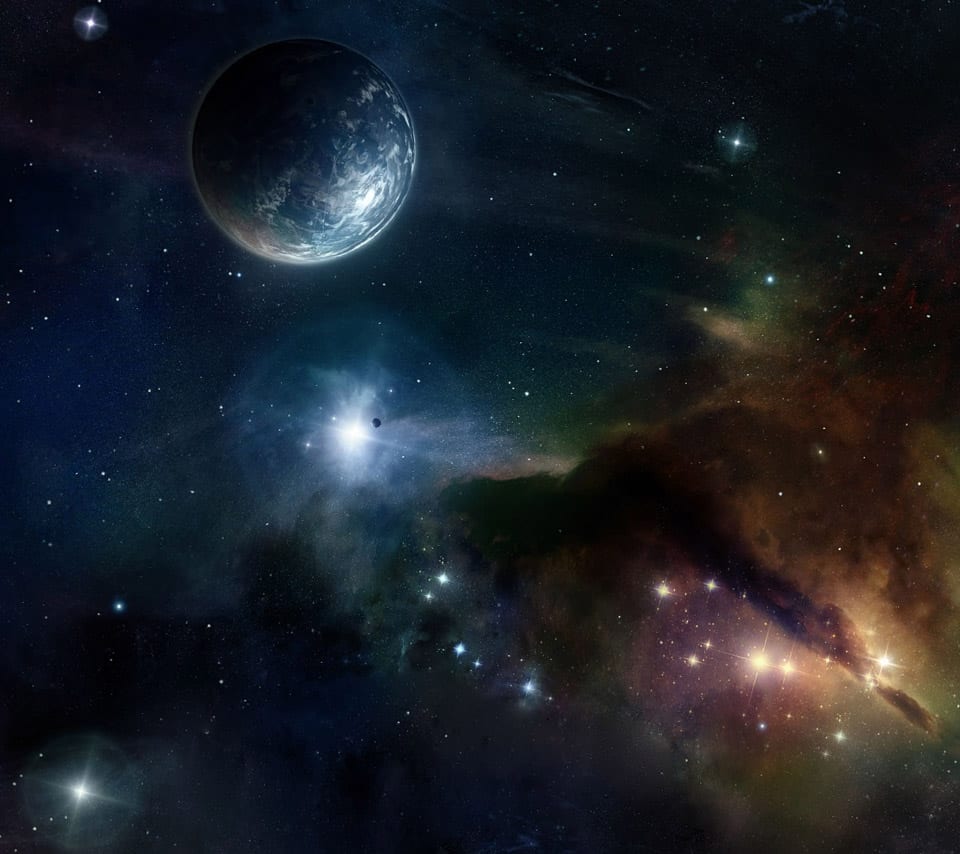The question
 The whole cosmos with all of its heavenly bodies, around 1025 (moons, planets, stars, galaxies etc) rotating and orbiting in perfect harmony, life in all of its enormous variety and all of the laws and constants that govern them; how did it all come into existence?
The whole cosmos with all of its heavenly bodies, around 1025 (moons, planets, stars, galaxies etc) rotating and orbiting in perfect harmony, life in all of its enormous variety and all of the laws and constants that govern them; how did it all come into existence?
To put it another way in the form the question proposed by Gottfried Wilhelm Leibniz, who wrote in The Principles of Nature and Grace, Based on Reason 1714, The first question which we have a right to ask will be, Why is there something rather than nothing?
The answer
The French philosopher Rene’ Descartes (1596-1650) famously said; I think therefore I am, he went on to say; Because I think, therefore it is impossible that God does not exist. So philosophically the existence of God makes sense.
Let us look at it another way; the Bible states in Genesis chapter 1 verse 1; In the beginning God created the heavens and the earth; a summary statement followed by God speaking and it coming into existence as in verses 4, 6, 9, 11, 14, 20, 24 and 26. So how reasonable is this as an explanation of how everything came about?
There are only two possibilities for the universe and life’s existence, these are:
Everything was created by a supernatural being
OR
Everything was created by nothing
The second is illogical and there is no third.[1]
The reader might be thinking that the idea that “nothing” created everything from nothing is prosperous and nobody would entertain such an idea. But atheists are trapped, because “nothing” is all they are left with. If there was something present through which everything came, then who or what create that “something.” Undaunted, they put their faith in the creative power of nothing:
Theoretical physicist Lawrence Krauss of Arizona State University, presented in a recent book, his claim that the laws of physics could have created the universe from nothing.[2] For a thorough rebuttal of Klauss’ claims, see Dan Reynolds’ article in Journal of Creation.[3]
Cosmologist and Massachusetts Institute of Technology professor Alan Guth, had this to say:
The universe burst into something from absolutely nothing—zero, nada. As it got bigger, it became filled with even more stuff that came from absolutely nothing.[4]
Luke Barnes, a non-creationist astrophysicist who is a Postdoctoral Researcher at the Sydney Institute for Astronomy, University of Sydney, Australia, is scathing about Krauss and those who argue like him:
First and foremost, I’m getting really rather sick of cosmologists talking about universes being created out of nothing. Krauss repeatedly talked about universes coming out of nothing, particles coming out of nothing, different types of nothing, nothing being unstable. This is nonsense. The word nothing is often used loosely—I have nothing in my hand, there’s nothing in the fridge etc. But the proper definition of nothing is “not anything”. Nothing is not a type of something, not a kind of thing. It is the absence of anything.[5]
Let’s be clear, nothing means no thing, no energy, no quantum vacuum, no gravity, no laws, no potential and no physical properties. As well, as some have argued, it is self-contradictory to say, the universe can create itself, because if the universe were able to create itself, it would have had to have existed already and would not need creating anyway.
Interestingly, a Supernatural Being has contacted us and told us that it was He who created everything. Also, He told us how and in what order He did it; we can read about it in the Bible; Genesis chapters 1 and 2. The reason He did it, was because it pleased Him.[6] Being loving and compassionate, He did not stop at that, He gave us laws to live by so that our societies would flourish and individuals would be protected.
Supporting evidence for Supernatural creation comes from the Cosmological Argument (The First Cause Argument)
The Cosmological argument is a powerful philosophical tool, which is based on a universal law, applicable in all science and human experience. It leads to the conclusion that there must have been a Creator.
 The argument goes like this: in our everyday experiences, we observe and know that nothing happens by itself, but rather that everything that happens has a cause. Something cannot come from nothing. For example, suppose you were with a friend and you heard a loud boom, and you said to your friend, “What was that?” and he said, “Nothing, just a boom,” you would know that his answer could not be right, because there cannot be a bang or boom without something causing it. Every effect, the boom in this case, must have a cause.
The argument goes like this: in our everyday experiences, we observe and know that nothing happens by itself, but rather that everything that happens has a cause. Something cannot come from nothing. For example, suppose you were with a friend and you heard a loud boom, and you said to your friend, “What was that?” and he said, “Nothing, just a boom,” you would know that his answer could not be right, because there cannot be a bang or boom without something causing it. Every effect, the boom in this case, must have a cause.
Since the law of cause and effect applies, it must apply to the whole universe and to every part of it. The entity that brought about that first cause by the process of creation must be independent (or outside) of creation and also outside of time. This Creator must be living, eternal, omnipotent, omniscient, omnipresent, conscious and moral,[7] and creation must have been volitional. Thus, the basic premise of biblical theology: In the beginning God created the heaven and the earth is in complete harmony with this argument.[8]
The most common objection to the argument of a creator God is: “Who created God in the first place?” The response is: everything that has a beginning has a cause. The universe had a beginning and the First Cause argument applies. God did not have a beginning as He is outside of time. In fact, time started at the instant of creation, so the First Cause argument does not apply to God.
Conclusion
Atheists, sceptics and non-believers in general say; “Christians are not realists they believe in something that does not exist and they need a psychological crutch to get by. However, we who are more intelligent follow science which has shown that there is no need of a god to account for our presence.” What has been shown here is that non-believers have to reject science and believe the absurd; that “nothing” created everything which not only includes the whole cosmos, but all life with its incomprehensible complexities, in order to uphold their atheistic belief. The fact that God created everything is intellectually credible.
Psalm 14:1 The fool says in his heart, “There is no God.”
[1] The idea that the universe has always existed is not tenable because its amount of usable energy is decreasing in accordance with the Second Law of Thermodynamics and it will eventually end with no motion within it and a uniform temperature throughout it. It was created wound up and it is now winding down.
[2] Krauss, L. A Universe from Nothing. New York: Free Press, 2012.
[3] Dan W Reynolds, Journal of Creation, April 2013, 27(1), pages 30-35. http://creation.com/review-krauss-universe-from-nothing.
[4] Discover, April 2002. DISCOVER, April 2002
[5] L Barnes, Out of nothing, letterstonature. WordPress.com, April 1, 2011. Cited by Jonnathan Sarfati, http://creation.com/god-created-not-quantum-fluctuation, November 21, 2013.
[6] Isaiah 43:7; Colossians 1:16; Revelation 4:11.
[7] Since the concepts of morality and righteousness, although abstract, are nonetheless real, they must be part of the First Cause.
[8] H. M. Morris, The Biblical Basis for Modern Science, Baker Book House, 1984, page 33.